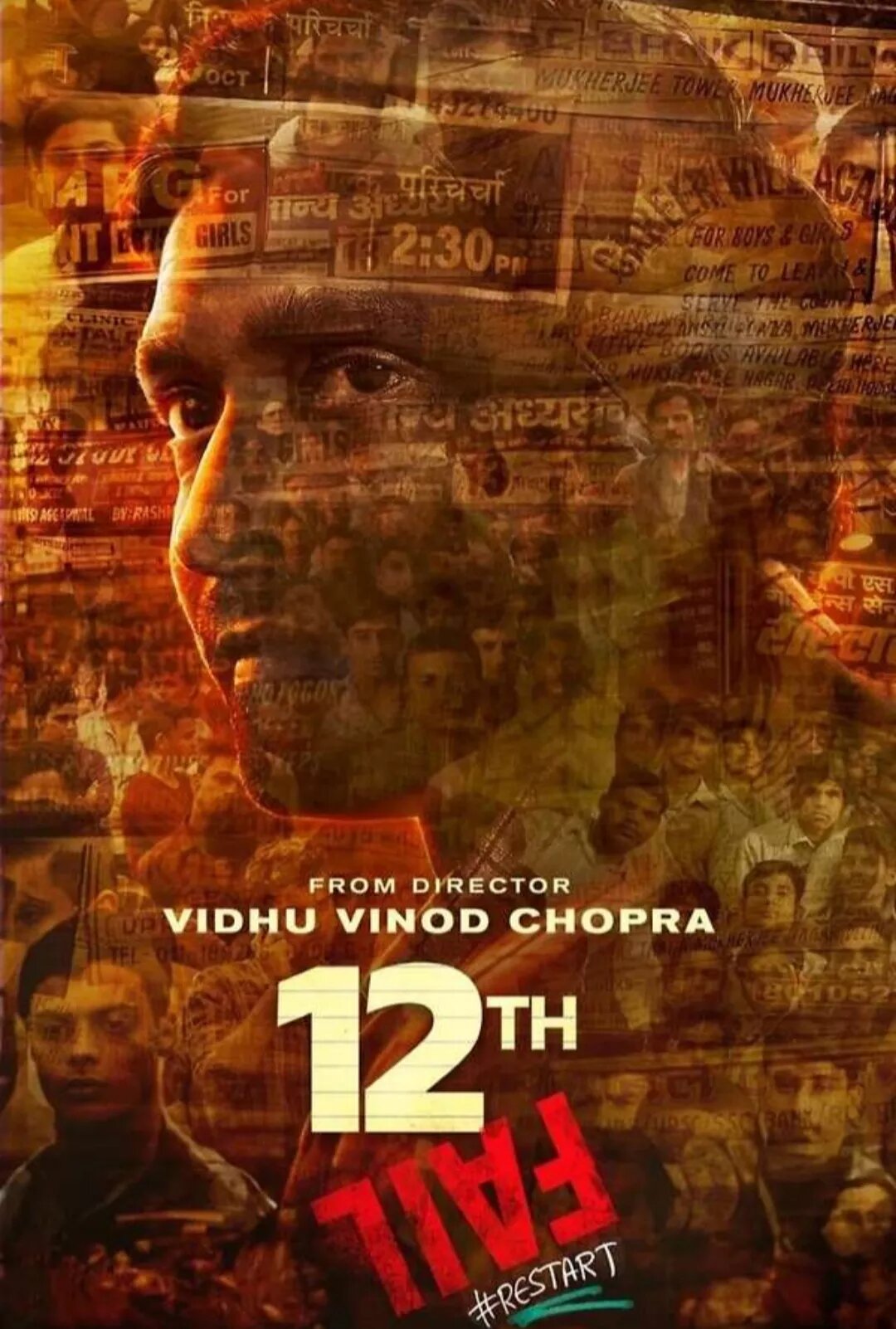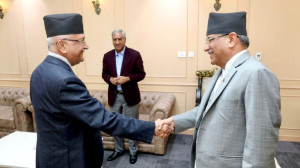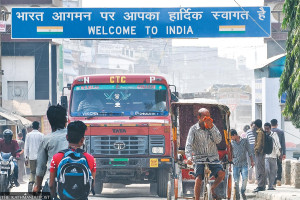 16.12°C Kathmandu
16.12°C KathmanduMovies
A story of restarts
‘12th Fail’ offers a refreshing tale of motivation through a simple and realistic storyline.
Aarati Ray
When I first learned about ‘12th Fail’, a movie based on the life of Manoj Kumar Sharma, I was puzzled by the title. I wondered why someone would choose to name a big film project that. I also had some reservations, as I was expecting it to be a typical coming-of-age and success story. Success narratives always attract audiences, but in this film, it’s Vikrant Massey’s character Manoj and his ‘can do’ attitude, persisting until the last breath, that captivates viewers. The line, “haar nahin manunga, raar nahi thanunga” (Won’t give up, won’t engage in debate), defines the movie, resonating with everyone by portraying the determination to start anew during challenging times. The movie’s theme of continuous failure touches the wounds of those who have stumbled and celebrates the resilience of those who have ‘restarted’.
In an era dominated by movies like ‘Animal’, ‘Pathan’, ‘KGF’, and ‘Salaar’, which tend to over-glorify things a lot, ‘12th Fail’ feels like a breath of fresh air. Writer-director Vidhu Vinod Chopra presents a heartwarming story that celebrates honesty and simplicity in life with a realistic narrative. Based on Anurag Pathak’s novel of the same name, the movie follows Manoj Kumar Sharma’s journey from Chambal. Despite dropping out after the 12th grade, Manoj takes on the challenging Union Public Service Commission (UPSC) exam, depicting a raw and genuine scenario that resonates with the struggles of UPSC aspirants and anyone facing challenges in pursuit of their dreams.
The film underscores the importance of restarting for those who don’t succeed initially, connecting with the experiences of thousands of students who attempt the UPSC exam in India each year. While focused on the narrative of UPSC students, it tugs at the heartstrings of all the ‘losers’ who have faced setbacks at some point in life.
Character development and generational change play pivotal roles in engaging the audience. In ‘12th Fail’, we witness the Sharma family’s ongoing struggle against corruption. Manoj takes on corruption in the education system, his brother fights against unfair treatment of lower-middle-class families, and his father stands against the ‘vidhayak’ who exploits poor farmers. Notably, both his father and brother express their dissent by hitting the ‘vidhayak’ and his goon with slippers.
However, a shift occurs when Manoj decides not to resort to violence when his father faces punishment. This moment, though not heroic, is relatable, as Manoj initially raises his slipper in frustration but refrains, making it feel more authentic. Despite the challenges, he draws inspiration from an honest police officer, aspiring to change his destiny through education, with the goal of wearing the uniform and bringing justice. The film portrays everyday struggles, ranging from a corrupt justice system to the aspirations of a middle-class family in pursuit of education and dreams. It avoids a self-sacrificing or overly ‘noble’ depiction, opting for a ‘humane’ and ‘realistic’ portrayal that resonates naturally with the audience.
The cinematography and execution of scenes in the film are masterfully done. Director Vidhu Vinod Chopra skillfully conveys the inner struggles of characters without relying on dialogue, using external chaos as the backdrop. The film strikes a perfect balance between metaphor and imagery. In one scene, Manoj and his brother walk home in complete darkness after being rescued by DSP Dushyant Singh, played by Priyanshu Chatterjee. As they walk, Dushyant offers them a ride, with the audience only seeing the close-up shot of the jeep’s light. The scene shifts to Manoj looking at Dushyant admiringly. Despite no words being exchanged, the ‘light’ of the jeep serves as a metaphor for a new beginning, a shift in thinking, and a beacon of change for Manoj, who resolves to give up cheating at that moment.
Similarly, when Manoj wakes up at the bus station to discover that his bag and hard-earned pension from his grandmother are stolen, his entire world and determination to become a DSP come crashing down. These scenes are filled with sounds and chaos—of horns and people shouting—and Manoj standing silently amid rotating camera scenes. This artistic direction, characterising Manoj’s emotions within an external setting, resonates with many. Small details, like when he sits outside the hotel watching others eat, accompanied by the sound of a hungry cat crying, reflect Manoj’s own hunger.
The director utilises quiet moments and pauses in the movie to string a powerful tale. Director Chopra demonstrates that even whispers can convey profound stories in the quiet moments between words. For instance, when Manoj’s parents, Ramveer (Harish Khanna) and Puspa (Geeta Agrawal Sharma), share a silent pause as Ramveer leaves to fight corruption, leaving his family of five without income, it conveys the weight of the sacrifice they are making. The scene where Puspa hands the lunchbox to Ramveer is filled with pauses, evoking a sense of the challenges ahead. Even the pivotal scene where Manoj learns his exam results is quiet, with few words, adding gravity and impact. The sparing use of dialogue throughout the movie emphasises how hard work, passion and emotion speak louder than words.
In a poignant scene, when Pritam (Anant V Joshi) starts live reporting, declaring, “A 12th fail, toilet sweeper, aata chakki boy—my friend Manoj Kumar Sharma has become an IPS topper,” hits hard. And when Manoj calls home to share the good news, his mother inquires, “IPS bangayo reh?” (Have you become an IPS?), and Manoj’s tearful and soft “yes” in response brings to life the dreams of thousands who aspire to make that call home one day. It symbolises the desire to inform parents of success and witness them walking with pride because of their children’s achievements. This scene has prompted many viewers to express their own aspirations, saying, “I will call home someday with good news.” It serves as a moment that inspires others to hope for future success.
Gauri Bhaiya (Anshumaan Pushkar) is another character that resonates with everyone. The scene where Gauri Bhaiya talks to Nawal about the determination of poor people begins when he places the kettle on the table; at that moment, all external sounds cease, and only his voice is heard, perhaps because the truth stands out loudly. Pushkar’s portrayal of emotions in this scene showcases the highest calibre of acting in the movie. The friendship between Manoj and Pritam is exemplary. Pritam guides Manoj in his IPS dream, helping him realise his true aspirations and Manoj, in turn, helps Pritam stand courageously against his father to pursue his real dream of working in the TV industry. against his father to pursue his real dream. Their friendship is so pure and loyal that it evokes envy.
A notable feature of Chopra’s direction is ensuring the movie isn’t solely centred on the main character. The audience can connect with each character in the story, as they all have a compelling and well-developed narrative, making the film both enjoyable and relatable. While Manoj’s story is inspiring, the film isn’t exactly as entertaining as most Bollywood commercial box office hits. In the middle, it slows down and loses some of its charm when every action and scene is focused on delivering a lesson. Nevertheless, ‘12th Fail’ is overall a movie worthy of your time. It stands out, particularly in a cinematic landscape crowded with over-the-top and glorified productions, offering a refreshing tale of motivation through a simple and realistic narrative.
12th Fail

Director: Vidhu Vinod Chopra
Cast: Vikrant Massey, Medha Shankar, Anant V Joshi, Anshumaan Pushkar
Year: 2023
Language: 2 hours 26 minutes
Available on YouTube

















